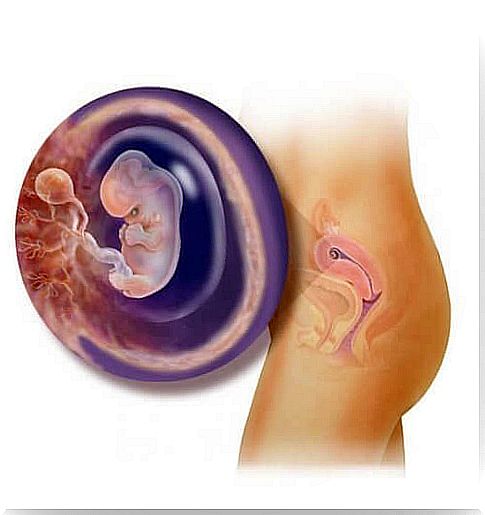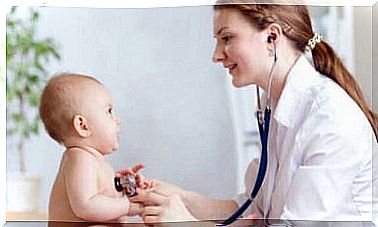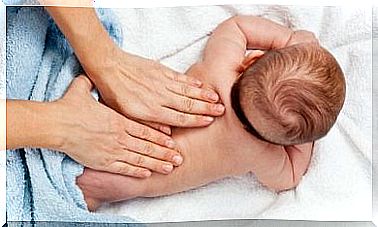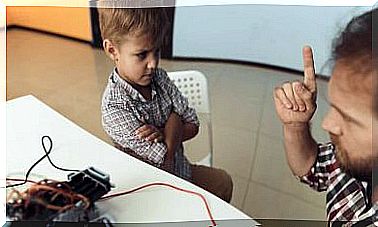Fetal Development: Phases And Influential Factors

An embryo turns into a fetus in the eighth week in the womb. At this stage of fetal development, it already measures approx. one and a half centimeters, and its weight is not quite one gram. We will go through fetal development in this article.
Despite the size of a bean, the fetus is already making its first movements. Of course, these are still imperceptible to the mother.
During this period of fetal development , traits and extremities begin to form. The lips, eyelids, nose and ears develop in early pregnancy, as do the fingers and toes.
As for the osteomuscular structure, the bones that begin to take shape can be seen through the skin, although at present they are still only cartilage. The heart and liver are functional again and continue to develop.
Subsequently, the fetus will develop even more week by week, until the moment it meets the world that awaits it.

What changes does the mother go through during fetal development?
Some symptoms that pregnant women may suffer from at this time are:
- Discomfort or pain in the abdomen as the fetus increases in size
- Weight gain for the same reason
- Increase in breast size. This is due to the widening of the canals where the milk circulates
- Nausea and vomiting
- More sensitive sense of smell. This can cause vomiting by feeling reluctant to certain foods or unpleasant odors.
- Fatigue. The body works hard to create another person inside it. This can cause a lot of fatigue, in addition to deterioration of rest due to any of the above symptoms or nerves.
Factors that may alter the normal development of the fetus
The main factor, or at least the most important, is the mother’s diet. More food can create a change in the behavior of the fetus. It is generally said that sweets provide greater movement.
Therefore, it is important that the mother eats a healthy and balanced diet throughout pregnancy. And that does not mean “eating for two”, but rather eating proteins, vitamins and other specific nutrients, both of which are needed throughout the pregnancy.
It is also important to avoid unhealthy habits like smoking or drinking alcohol.
In addition, if you suffer from a food pathology, such as high cholesterol, diarrhea or diabetes, you need to give yourself special care. Contact a doctor before complications occur to avoid major problems in the future.
On the other hand, a study published in the American Journal of Obstetrics and Gynecology confirms what many others have said so far: exercise during pregnancy is safe and can benefit both mother and baby.
However, it is always better to talk to a specialist to choose the type of exercise to be performed.
It is also very important that you perform periodic ultrasound tests to ensure that everything is going well.
With an ultrasound you can see the baby, hear his heart and check his growth.
These are very important for the control and monitoring of pregnancy.
Signals that you should look for during fetal development
According to Sutter Health – the network of hospitals and doctors, it is important for the mother to consult her trusted doctor if any of the following symptoms occur:
- Blurred vision, spots or outbursts of light, with or without headache
- An area of hot pain in the calf or behind the knee
- Pain or burning sensation when urinating or urinating at an unusual frequency
- Fever of 37 degrees or higher for more than 24 hours
- Sudden severe or continuous pain or cramps in the abdomen
- Bleeding or vaginal spots
- Injuries to the stomach
- A sudden severe swelling of your hands, feet or face
- Sores or blisters in the vaginal area (possibly herpes)
- Symptoms of vaginal infection, including itching, burning and an unusual discharge
- Being involved in a car accident
- Continuous flow of a small amount of fluid from the vagina or a flow of water from the vagina
- Nausea, diarrhea or vomiting for more than 24 hours
Ultimately, it is noteworthy that technological advances have made it possible to detect many complications that the fetus can produce throughout its pregnancy, such as diabetes or spina bifida.
This is another point in favor of regular checks.









